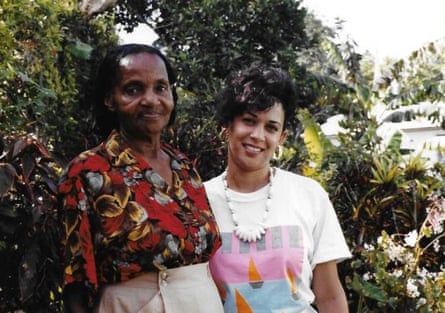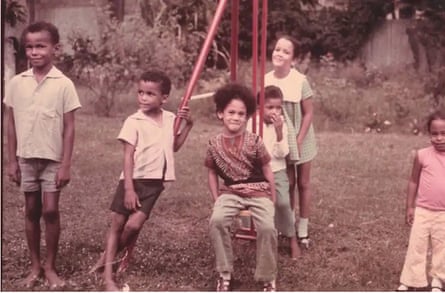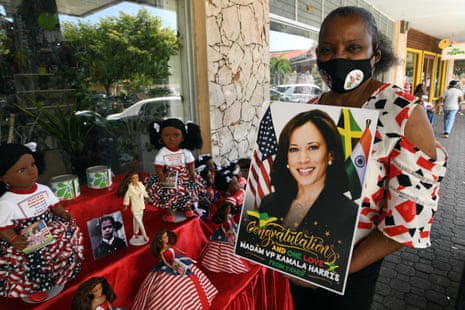As she watched America’s inauguration ceremony last week, Aziza Jones switched back and forth between her social media and her television, hoping the extra energy use didn’t generate a power outage – a setback she said can be common in St Croix, US Virgin Islands.
From her home, the non-profit worker thought of her parents as she witnessed Kamala Harris – the daughter of immigrants from Jamaica and India - become the United States’ first female, vice-president of Caribbean descent.
“Everyone was excited to have another Caribbean woman fighting for us,” she said, pinpointing the Virgin Islands congresswoman Stacey Plaskett as the other. “My parents would have wanted to vote for her so it was like making their dream come true.”
As residents of the Caribbean territory, Jones’s parents are among the more than 100,000 Virgin Islanders who even as American citizens, are ineligible to vote in the general election. She said casting her absentee ballot as a resident of Illinois felt like giving them a voice.
This article includes content provided by Instagram. We ask for your permission before anything is loaded, as they may be using cookies and other technologies. To view this content, click 'Allow and continue'.
In cities such as New York, Miami and Boston, the historic milestone saw many Caribbean Americans spend their inauguration day honoring Harris in family group and WhatsApps chats – similar to many Indian American celebrations shared on what is sometimes called Desi Twitter.
For a diaspora representing a region of 45 million Caribbean people, including countries such as Jamaica, Haiti, Cuba and Guyana, the buzz signified that an American voting bloc some have considered overlooked was finally getting due recognition.
“There was an immense sense of pride from all over,” said Shurland Oliver, executive director of Vote Caribbean, a Washington DC-based voter advocacy group. “Caribbean Americans saw [Harris] as one of our own – a symbol of the excellence we can achieve.”

According to Migration Policy Institute, the Caribbean diaspora in the US consists of more than 8 million people who were either born in the region or reported having ancestry of a given Caribbean country, including an estimated 4.4 million immigrants.
More than 90% come from Jamaica, Trinidad and Tobago, Haiti and the Dominican Republic.
That growing diaspora of Caribbean American voters was a bloc Joe Biden’s campaign sought to engage, primarily in battleground states like Florida and Georgia where their population growth has worked to strengthen Black voter turnout.
In Georgia, Caribbean voters in the state’s Senate runoff helped steer turnout to records numbers, securing victories for the newly sworn-in Democratic senators Raphael Warnock and Jon Ossoff.
“It’s about that exposure,” Oliver said. “We’re mistakenly lumped into the same groups as African Americans when politicians have needed to engage with our communities in ways that speak to our unique cultures.
“With [Kamala Harris], they were able to,” he said.
Vote Caribbean led get-out-the-vote efforts throughout communities in urban, Democratic strongholds, including with Virgin Islanders in Georgia, Haitian Americans in south Florida, and Jamaican Americans in Pennsylvania.
Harris has thanked these groups for their support, noting the diaspora “did the work” helping Democrats win in November. The White House has since announced several administration hires of Caribbean American descent.
Jackie Watson, founder of the Caribbean Association of Georgia, created the state’s Caribbean Chamber of Commerce to connect the growing business community. Based outside of Atlanta, the Jamaican-American then worked to educate area West Indians about the 2020 census, registering recently relocated or newly naturalized residents to vote.
She found inspiration in a vice-president whose family origins go back to “Jamrock”, an affectionate nickname for her island home of 3 million.
“Jamaica, and the Caribbean as a whole, isn’t new to female leadership,” she said, noting the country’s former prime minister Portia Simpson-Miller. “But Kamala serves as an example for Jamaican parents to tell their foreign-born children that they can be anything and still know where they come from.”
While her relationship with her father is reported to be strained, Harris has tipped her hat to her Caribbean heritage.
“I am proud to be with you as a vice-president-elect with roots in the Caribbean,” she told attendees of an Invest Caribbean pre-inauguration ceremony in her honor, recognizing the community as woven “throughout the fabric of our country”.

She highlighted how she forms part of a line of notable Jamaican American lawmakers, including the former US secretary of state Colin Powell, the former attorney general Eric Holder and the New York congresswoman Yvette Clarke.
The vice-president also noted her “For the People” campaign slogan had been inspired by Shirley Chisholm, the Barbadian American who became the first Black woman elected to Congress and first Black candidate for a major party’s nomination for president.
Harris was congratulated by Caribbean lawmakers and heads of state throughout the region. The office of Antigua and Barbuda’s prime minister, Gaston Browne, shared photos of staffers wearing pearls in solidarity.
“Vice-president [Harris’s] campaign image showed us that it is entirely okay to be your authentic self, something we can all proudly emulate,” executive assistant Shenella Govia wrote.
Family members have expressed excitement for Harris, and throughout the Caribbeanpeople tuning in from home and public viewings of the inauguration proudly touted Harris’s ancestry.
Krystal Paige-Robertson, a Jamaican American philanthropist living in Kingston held back tears remarking that her daughter “will be able to look and see herself in the second highest office in the United States”.
“I cannot tell you what this means for all of us. It was a genuine feeling of self-assuredness, love and accomplishment,” she said, noting the occasion held special significance for those who, like her, are also Jamaican Howard University alumni.
This article includes content provided by Instagram. We ask for your permission before anything is loaded, as they may be using cookies and other technologies. To view this content, click 'Allow and continue'.
In a statement to the Guardian, the university’s president, Dr Wayne AI Frederick, called Harris an “inspirational figure to women, to the Black community, to the south Asian community, to the Caribbean community and to the children of immigrants”.
“Her achievements have expanded the realm of possibility for so many communities that have constricted their dreams, lowered their expectations and limited their imaginations,” the Trinidadian alumnus said.
Many Caribbean leaders are eager to hit the reset button on frosty US-Caribbean relations. The Biden administration has already committed to a pivot from a Latin American and Caribbean foreign policy that had the former administration often bypassing Caricom, the region’s inter-governmental body.
That relationship is critical for a region reliant on tourism and the $12.6bn in remittances sent back home by nationals living in the US.
“I am sure that we in the Caribbean will look forward with optimism to working with the new administration to confront a number of global issues from the awful pandemic, to the climate crisis, to the pursuit of racial justice,” Barbados’s prime minister, Mia Mottley, said in a statement.
Back in St Croix, Jones remained hopeful a Caribbean vice-president could forward the fight for voting rights of the more than 4 million American citizens living in US territories – like the Virgin Islands and Puerto Rico – who can fight for their country in the military, but can’t vote for its president in an election.
“Not everything can be done for everyone,” she said, doubtful of policy initiatives within the first years of the new administration. “But what does matter is we’re starting the right dialogue for politicians to address our community’s individual needs.”
Whether the result is an eventual boost in Caribbean immigrants migrating to the US, or attending Black colleges and other universities as international students, Oliver argued a Harris vice-presidency already makes clear that Caribbean diasporas are a force.
“It’s now on us to capitalize on this momentum, recognize our strengths and press forward with policy that, like [Harris] says, is ‘for the people’,” he said. “Our people.”
